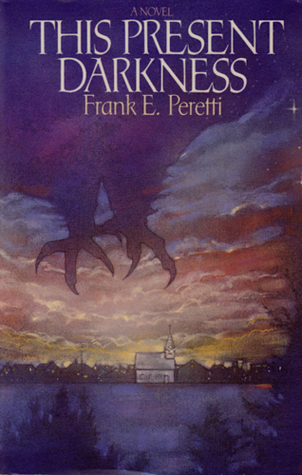C.S. Lewis famously said, in his introduction to The Screwtape Letters, “There are two equal and opposite errors into which our race can fall about the devils. One is to disbelieve in their existence. The other is to believe, and to feel an excessive and unhealthy interest in them.”
Apparently, the authors of a recent article at Vox, Revisiting the Christian fantasy novels that shaped decades of conservative hysteria, have succumbed to the first of those errors. Not only do they openly sneer at those who believe “Angels and demons [are] engaged in very real, literal battles for humanity,” they also frame such beliefs as “conspiracy theories.”

The basis for their critique is Frank Peretti’s This Present Darkness series. First published in 1986, the story revolves around a plot to control the citizens of the small town of Ashton. Behind a powerful New Age group are demonic entities, manipulating the unsaved. However, a spiritual battle ensues involving angels and prayerful Christians seeking to quell the darkness. The book has since sold over 2.5 million copies.
The authors at Vox assert that Peretti’s novels “were formative and fundamental” in shaping “the dominant worldview of many right-wing US conservatives, especially white evangelicals.” What is this “dominant worldview”? Well, apparently it’s not just the belief that spiritual warfare is real, but that it impinges upon social, religious, and political structures.
Peretti wasn’t creating the concept of spiritual warfare. The notion of angels and demons battling among us has been around for centuries; the Christian idea of humans helping them comes to us from Ephesians. In the 1980s, such rhetoric percolated on talk radio, in contemporary Christian music, and in churches, all at odds with modern mainstream culture. But his novels, with their thorough version of an embattled but entirely righteous Christian culture, are an early articulation of what has become the reigning modern evangelical conspiracy theory.
So what exactly is this “reigning modern evangelical conspiracy theory”? Well, it’s not “the concept of spiritual warfare,” because that “has been around for centuries” and finds root in Scripture itself. According to the authors at Vox, the “conspiratorial” elements of evangelical belief in spiritual warfare is that it intersects “with modern mainstream culture.” So belief in spiritual warfare is rather harmless until it is superimposed over real-life. The only demon the materialist will entertain is the one who is found solely in fiction. In other words, belief in devilish deception is tolerated so long as it isn’t traced to politics and popular culture. God forbid we find the devil in our schools, theaters, or state capitols.
Belief in devilish deception is tolerated so long as it isn’t traced to politics and popular culture. God forbid we find the devil in our schools, theaters, or state capitols.
However, this is exactly what the scolds at Vox appear to insinuate
The Darkness duology arrived at the peak of Satanic Panic, when, as Peretti later wrote, “demons — and their doctrines — were gaining a weird, glassy-eyed respect from the popular culture.” Peretti envisioned a new kind of Christian fiction that visualized and vivified his idea of modern spiritual warfare: Angels and demons engaged in very real, literal battles for humanity, often just out of sight of their impassioned human charges.
Peretti’s offense, it seems, was not just in “vivifying” this idea of “modern spiritual warfare,” but in framing it as involving “literal battles for humanity.” How dare this Christian author suggest that a real devil is really out to deceive people! You see, modern men cannot have literal devils. The concept of spiritual warfare is only permissible insofar as it remains a gauzy, allegorical exercise. Such “disbelief in the devil” is what seemingly characterizes this critique from the authors at Vox.
Modern men cannot have literal devils. The concept of spiritual warfare is only permissible insofar as it remains a gauzy, allegorical exercise.

In fact, their mention of “Satanic Panic” bears this out. The term has become a pejorative for paranoid evangelical witch hunters of the 1980’s. While the original Panic focused upon claims of Satanic cults and practices, as the movement spread it encompassed other forms of occultism, mysticism, and New Age esotericism. Which is why one of the authors noted sarcastically that in Peretti’s novels, “The devil’s primary weapon is New Age spirituality.” Please notice: the assumption throughout is that Satanism, occultism, and New Age mysticism are unduly scapegoated by Peretti and his ilk. Furthermore, this view of a literal devil using New Age or occult philosophy to deceive the world, as wielded by Peretti, is a gateway into QAnon-style conspiracism.
A recent survey revealed that a large number of right-wing Republicans — and 27 percent of white evangelicals — believe the central conceit of QAnon, the false conspiracy theory that Donald Trump is fighting high-powered Democrats and other powerful liberals who are engaged in sexually abusing, kidnapping, and sex trafficking children. The “liberal child-napping sex cult” theme of QAnon, and its recent “groomer” variant, seems to be the only thing literally different from the Peretti novels; everything else positing a high-powered government scheme to control the world and eradicate Christian culture is more or less identical.
It didn’t take long before the recent charges that schools and media outlets are “grooming” children for LGBTQ+ embrace was labeled as a conspiracy theory. In Child Grooming in Public Schools Is No Conspiracy Theory, Christopher Rufo notes how quickly charges of conspiracism were leveled against concerned parents.
In the wake of the controversy surrounding Florida’s Parental Rights in Education legislation, which prohibits public schools from teaching gender identity and sexual orientation in kindergarten through third grade, the national media has sought to paint conservative opposition as hysterical, anti-LGBTQ, and conspiracy-minded. The New York Times, for example, accused conservatives of having a “freakout” about imaginary “grooming” in public schools, and the Washington Post dismissed concerns about sexual abuse by teachers as a “QAnon conspiracy.”
Likewise, it does not seem a coincidence that the writers of the Vox piece so easily connect Peretti’s “vivifying” of the concept of “modern spiritual warfare as part of an ongoing “conservative hysteria,” specifically as it relates to QAnon.
Also, not coincidentally, many of Christianity’s core beliefs are now being grouped among bizarre conspiracy theories. For example, some suggest that creationism bears all the marks of a conspiracy theory. This means that Christians who believe that the earth was created in 6 literal days — a belief that was once common among Fundamentalists — are now, basically, cultists. Another alleges that those who believe in the Resurrection of Christ are “dangerous to others and themselves” and in need of psychological help. Still another author conflates a belief in demons and spiritual warfare with conspiracy theories.
So does a belief in demons or spiritual warfare make one susceptible to QAnon? Does belief in a literal devil who “masquerades as an angel of light” (II Cor. 11:4) and seeks to “lead the whole world astray” (Rev. 12:9) automatically make one a conspiracy theorist?
Christians may avoid the label of conspiracist by keeping their demons in the realm of ‘fiction.’ Problem is, not even the Bible does that.














Mike, I can see their point, though I agree they may be painting with too broad a brush. I’ve done a lot of academic work on the New Apostolic Reformation and academics from both Christian and secular circles have expressed concern that some of this QANON conspiracism may have come out of the NAR. Q-Drops work an awful lot like prophecy does in some of the more far out churches within NAR circles. Just an observation, though. Take it for what it’s worth.